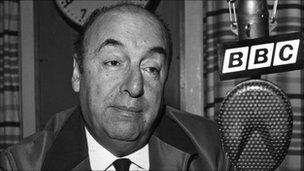Chile judge orders exhumation of Pablo Neruda's remains
- Published

A judge in Chile has ordered the exhumation of the remains of the poet Pablo Neruda, as part of an inquest into his death in 1973.
The left-wing Nobel Prize winner died 12 days after a military coup replaced the socialist president Salvador Allende with General Augusto Pinochet.
The poet's family has always maintained that he died in a Santiago clinic of advanced prostate cancer, aged 69.
In 2011, Chile started investigating allegations that he may have been poisoned.
The date of the exhumation has not been fixed yet.
His body is buried next to his wife Matilde Urrutia in Isla Negra, 120km (70 miles) west of the capital Santiago.
'End doubts'
Neruda was a Communist and a friend of President Salvador Allende.
But the foundation that guards his legacy says it believes Pablo Neruda died of cancer.
In a statement, it said it had been informed by the authorities of the exhumation plans a few days ago.
It also stated that it expected the operation would be executed "with the greatest possible respect and care" and that it would end "any doubts that might exist".
The current investigation was brought about after Neruda's former driver, Manuel Araya Osorio, said that agents injected the poet with poison at the clinic on the orders of General Pinochet.
Neruda was a fierce critic of the military coup, which he saw as a betrayal of his country.
His death is not the only one from that time to be re-examined.
In December 2011, after the remains of President Allende were exhumed, it was confirmed that he committed suicide, and was not killed by soldiers who stormed the presidential palace during the coup, as some had argued.
- Published5 December 2011
- Published30 December 2011
- Published23 May 2011